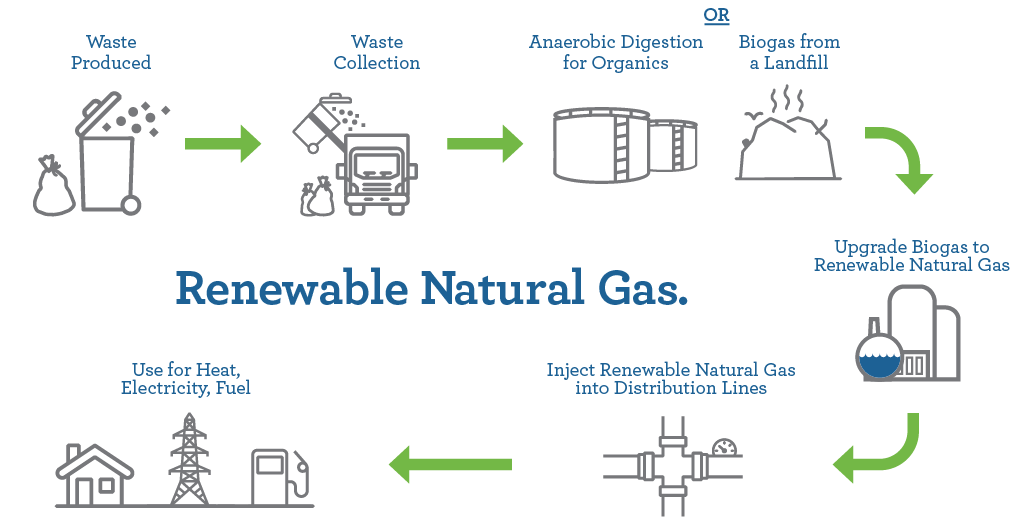Blog, Energy Roles Series
Fueling the Future with Renewable Natural Gas
This blog is the second of a series that focus on the application of specific energy types in a smart energy future. Stay tuned for the the role of District Energy!
Renewable energy in Canada accounts for about 17% of our total energy supply and 65% of our electricity production. Hydroelectricity makes up the majority of renewable energy produced in the country, however, wind power, solar power, tidal power and bio-energy are also an important part of the mix. One technology that is currently underutilized is Renewable Natural Gas (RNG). Canada has an opportunity to maximize one of our greatest energy assets – the natural gas pipeline system – by investing in RNG projects.

“Canada has an opportunity to maximize one of our greatest energy assets – the natural gas pipeline system – by investing in Renewable Natural Gas projects.“

RNG is not a new technology. It has been used extensively around the world for many years, especially in places where conventional natural gas is more expensive like Europe and Asia. In Canada, several RNG facilities are already operating or being developed including in Quebec, British Columbia, and Toronto.
Fueling the Future
RNG is a low-carbon fuel that is produced by capturing, cleaning, and upgrading biogas from landfills, organic waste, farms or wastewater treatment plants. It is distributed through the existing natural gas lines to customers.
Here is a high-level look at how RNG works:

Energy in Nova Scotia
Nova Scotia relies on a mix of energy sources, including high-emitting coal for electricity generation and oil, to keep residents warm. We need to start thinking outside the box for ways that we can reduce our carbon footprint and RNG can help.
Halifax, Nova Scotia was the first large municipality in Canada to implement a green bin program for organic waste back in 1998. The city has seen incredible success with the adoption of composting and recycling programs, including a very high separation rate for green bin organics. RNG presents another exciting opportunity to be leaders in creating a greener city.
RNG Potential
Taking advantage of RNG in Halifax could potentially heat over 5,500 homes or fuel over 400 transit buses with renewable energy.
Home heating and hot water is typically the biggest source of household GHG emissions. Heating accounts for approximately 80% of the energy used in a home and almost all heating fuels – electricity, heat pumps, fuel oil, propane, and natural gas – emit GHGs. Switching to RNG could significantly reduce a household’s carbon footprint.
Not only is RNG a green solution for energy consumption but it can also be produced at a competitive or lower cost compared to other renewable energy sources like wind and solar. Heritage Gas is actively working to support the development of RNG projects in Nova Scotia.
Finding ways to capture and reduce waste is a principle directly out of a Smart Energy Community playbook. Being smarter about not only how we produce our energy, but also how we use it, is an important lesson that will help Canada smoothly progress through the energy transformation now currently underway.
RNG Barriers
The development of RNG resources are not without their challenges. Under the right circumstances RNG can be a very cost effective clean energy source, however, significant planning and logistics must be taken into account to achieve this. Barriers to development include access to pipeline infrastructure, access to feedstocks to produce biogas, and the high capital investment required to produce RNG..
In 2017, Natural Resources Canada recommended an industry target of 10% RNG-blended natural gas in the pipeline distribution system in Canada by 2030. Government leadership to support the development of RNG projects can help to align the moving parts necessary to unleash the potential of RNG in Nova Scotia, as well as Canada wide.
RNG projects are an innovative way to help Canada transition to a low country while also maximizing the waste we all produce. If you are interested in learning more about low emissions energy systems, check out Canada’s Energy Transformation Report.
Learn about other Canadian RNG projects:
City of Surrey – Surrey Biofuel
Quebec, Saint-Hyacinthe – Information sheet about RNG
Toronto – Turning Waste into Renewable Natural Gas
Related
Read QUEST’s Principles for Smart Energy Communities
Sign Up
Join the Conversation!
Sign up to get the latest news and updates about QUEST Canada events and receive QUEST Canada's monthly newsletter.

